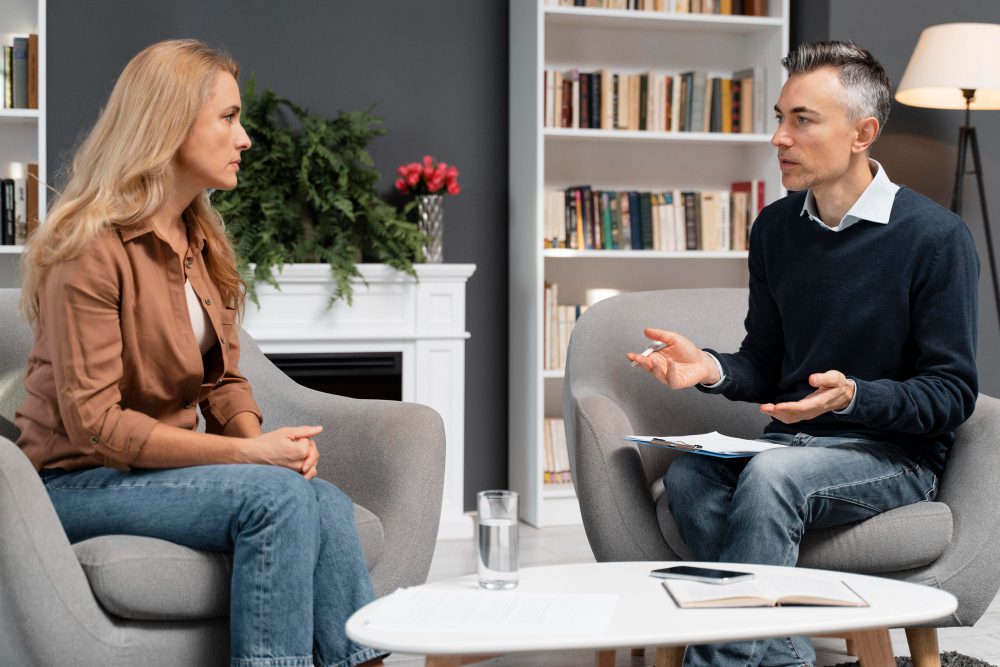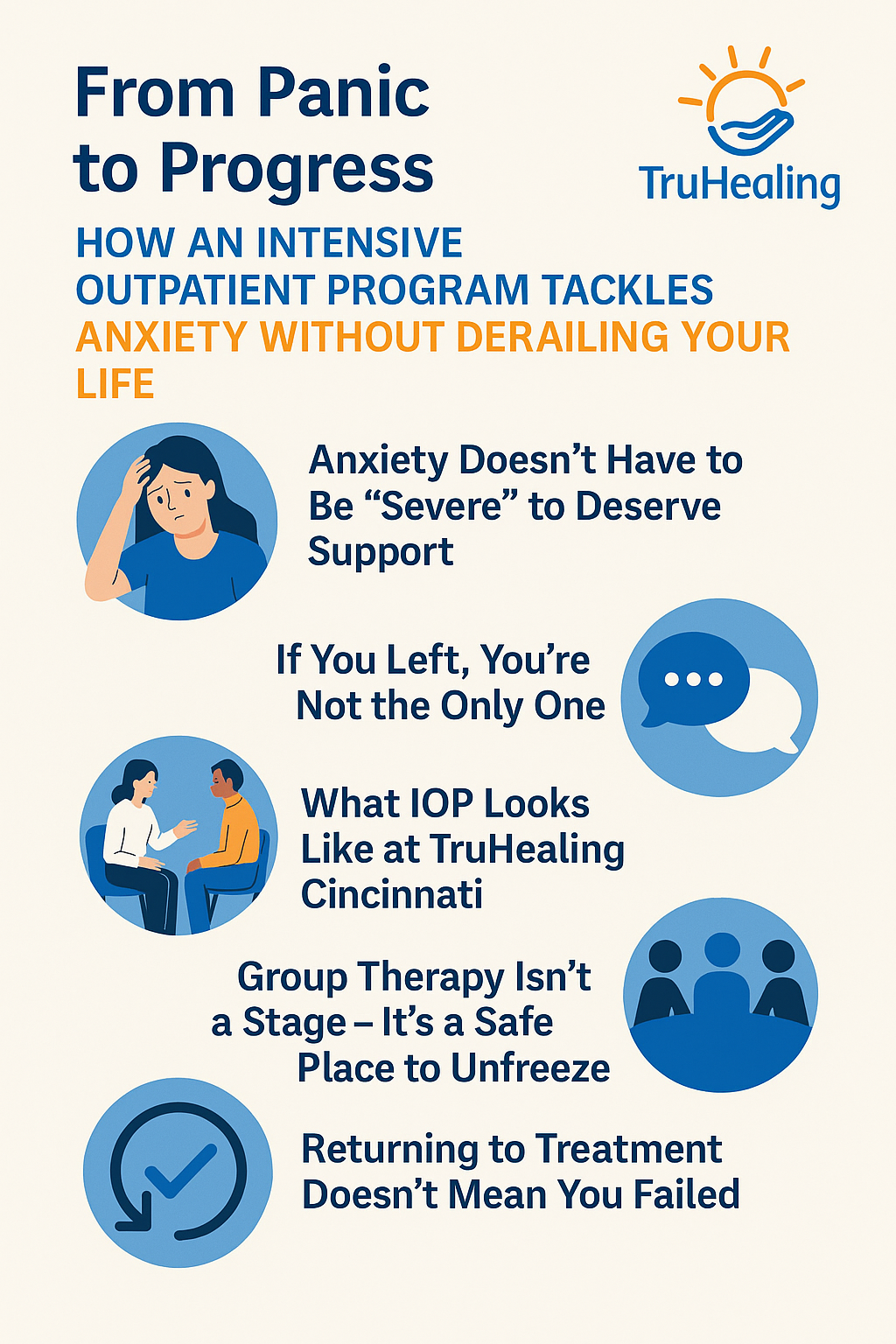Sometimes, anxiety doesn’t scream. It whispers, distracts, and slowly dismantles your ability to function—even when everything on paper still looks “fine.” You show up to work. You text people back (mostly). You even started treatment once. But somewhere between panic and pressure, you stopped going. Maybe it was one group missed… then three. Maybe you didn’t tell anyone. Maybe you told yourself, “I’ll go back when I’m doing better.”
Here’s the truth: You don’t have to be better to come back.
And you don’t have to fall apart to start again.
At TruHealing Cincinnati, we specialize in helping people re-engage with care—even if they’ve ghosted, dropped out, or feel too ashamed to make the first move. Let’s walk through how our intensive outpatient program (IOP) can support you through anxiety… without disrupting the life you’re trying so hard to hold together.
1. Anxiety Doesn’t Have to Be “Severe” to Deserve Support
High-functioning anxiety is real. You might still be getting things done—but it takes everything you have. Maybe your heart races during meetings. Maybe you cancel plans last minute. Maybe you can’t remember the last time you felt genuinely rested.
That kind of anxiety isn’t dramatic—but it’s exhausting. And it deserves treatment.
An intensive outpatient program is designed for people who need more than just a weekly therapy session, but who don’t need—or can’t afford to pause for—residential treatment. It’s support that wraps around your real life, instead of replacing it.
2. If You Left, You’re Not the Only One
A lot of people start treatment and stop. Sometimes they feel overwhelmed. Sometimes life gets chaotic. Sometimes anxiety convinces them they’re not “doing it right,” so what’s the point?
If that’s you, you’re not alone—and you’re not disqualified.
We don’t ask, “Why did you leave?”
We ask, “What do you need to come back?”
That’s the power of IOP. It’s not about perfection. It’s about staying connected—even if that connection has been messy, broken, or paused.
3. What IOP Looks Like at TruHealing Cincinnati
At our Cincinnati location, the intensive outpatient program typically includes:
- 3–5 sessions per week, often in the evenings
- Group therapy, focused on emotional regulation, anxiety skills, and mutual support
- Individual therapy, where you can explore what’s underneath the panic
- Psychoeducation, so you can understand how anxiety works (and how it doesn’t have to control you)
The flexible structure means you don’t have to quit your job or leave school. You can keep living your life—and still get help.
“Coming back felt like asking for directions after driving in circles. I thought they’d be mad. They weren’t. They were just glad I asked.”
– Former IOP Client, 2023
4. Group Therapy Isn’t a Stage—It’s a Safe Place to Unfreeze
We hear it all the time:
“I don’t want to talk in group.”
“I won’t know what to say.”
“I’m the one who left—what if they judge me?”
Here’s the truth: IOP groups aren’t about performance. They’re about presence.
You’re not expected to spill your life story on day one. Just show up. Breathe. Listen. The group becomes a mirror—and a soft landing—for people who’ve felt alone in their anxiety for way too long.
5. Returning to Treatment Doesn’t Mean You Failed
It’s easy to think, “If I’d really been committed, I wouldn’t have left.” But anxiety disorders—and especially avoidance-driven ones—don’t disappear because you “tried harder.” They respond to consistent, compassionate support. And sometimes that means trying again.
Think of rejoining IOP like returning to physical therapy after a pulled muscle. No one expects you to walk back in at full strength. They just meet you where you are—and help you rebuild.
6. How to Re-Enter IOP Without the Shame Spiral
Here’s what the re-entry process looks like at TruHealing Cincinnati:
- You call or message us. Just let us know you’d like to rejoin or talk options. No speech required.
- We listen. No pressure, no interrogation. Just a conversation about what would feel manageable.
- We rebuild a plan together. Maybe you return to the same group. Maybe you shift schedules. Maybe you just start with one-on-one.
- You show up once. Just once. And we take it from there.
No big reveal. No guilt-trip. Just a soft restart.
7. Quick Tips for Easing Back Into IOP
Quick Tips for Reconnecting After Time Away:
- Choose a low-stress day to call. It doesn’t have to be the “perfect” time.
- Be honest about what kept you away—but only if you want to.
- Ask if you can start with a one-on-one session before returning to group.
- Write down one word you want to feel again (peaceful, strong, connected).
- Remember: You don’t have to explain the past to be allowed a future.
8. Why Cincinnati Makes Sense for Anxiety Support
If you’re in the Cincinnati area, our location makes IOP accessible and sustainable. We know the pressures our community faces—from local work cultures to family dynamics to the unique stressors of city-suburb life. If you’re local to Lexington, Kentucky or Springfield, Ohio, TruHealing offers help that meets you exactly where you are.
We offer options that fit the real rhythms of Cincinnati life—not just clinical theory. You can find us close to home, close to help, and ready to welcome you back.
Explore our Cincinnati IOP here
FAQ: IOP for Anxiety at TruHealing Cincinnati
What if I’ve dropped out before—can I still return?
Yes. Many clients pause and come back. You are always welcome to re-engage. No judgment, no punishment.
How long does IOP last for anxiety?
It depends on your needs, but many clients attend for 6–12 weeks. We tailor the duration based on your goals and progress.
Can I still work or go to school while in IOP?
Absolutely. Sessions are typically in the late afternoon or evening to fit around work and school schedules.
Is this program just for addiction? I only have anxiety.
Our IOP supports mental health, including anxiety, panic, and depression. You do not need to have a substance use issue to attend.
I’m not sure I’m “bad enough” for IOP. Should I wait?
If your anxiety is interfering with your daily life, even subtly, it’s worth reaching out. IOP is a proactive step—not a last resort.
📞 Need a No-Pressure Way Back?
Call (888) 643-9118 or visit TruHealing Cincinnati’s IOP page to reconnect with care—quietly, gently, and without shame. You’re not starting over. You’re just picking up where you paused.


